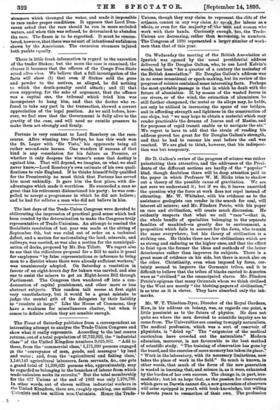Sir D. Galton's review of the progress of science was
rather painstaking than attractive, and the addresses of the Presi- dents of the different sections are hardly of the " popular ' kind, though doubtless there will be deep attention paid to the paper in which Professor W. M. Hicks tries to shadow out a theory of the possible cause of gravitation. We are not sure we understand it ; but if we do, it leaves unsettled the question why the force at work does not repel instead of attracting. Mr. W. Whitaker, with his evidence as to the assistance geologists can render in the search for coal, will interest all miners; and Mr. Flinders Petrie, with his paper on race and civilisation, will create much discussion. He evidently suspects that what we call " race "—that is, the whole bundle of specialties belonging to the separate families of mankind—is greatly due to environment, a proposition which fails to account for the Jews, who remain the same everywhere; but his theory of civilisation is a striking one. He thinks there are low civilisations which are as strong and enduring as the higher ones, and that the effort to foist upon the former the ideas and methods of the latter deteriorates rather than improves its subjects. There is a great mass of evidence on his side, but there is much also on the other. Christianity, even when imposed by force, cer- tainly seemed to improve the Germanic tribes, and it is difficult to believe that the tribes of blacks carried to America were as "civilised" as the emancipated slaves. Mr. Flinders Petrie's epigram that many Orientals whom we think civilised by the West are merely " the blotting-papers of civilisation," is as true as it is clever. They have absorbed only the ink- marks.


































 Previous page
Previous page